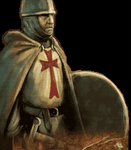Date: 25th October 1415
Agincourt in northern France
Henry V was an outstanding soldier, strategically and tactically aware he was ruthless to religious and political opponents.Born in 1387 he spent most of his life in warfare and died while campaigning in 1422.
After taking the town of Harfleur Henry moved across France. On the 24th October he found his way blocked by a French force of 25,000 heavily armed troops.
They prepared for the battle which would surely see the English wiped out the next day.
By this time Henry had only 6,000 men, comprising of 5,000 archers and 1,000 men-at-arms. However the archers were armed with a weapon that was to command battlefields for years to come, the English Longbow.
Probably Welsh in origin, and adapted, the longbow required immense strength to fire, but it had a huge range and an experienced man could fire twelve arrows in a minute, the crossbow could manage only two. The English had perfected the art by making it law for the populace to practice on Sundays. Even today many villages and towns still have a village green which was originally used for this purpose.The huge French army, which was led by Charles D'Albret, sat and waited for the English to make a move so that it could go in for the kill.
Henry decided to advance to within 200 yards of the French with the cry 'Advance banners!'From there they sent a volley of arrows which struck ferociously into the first French ranks.There had been heavy rain and the ground, which was ploughed, was soft and muddy. In addition the field was narrow and thick woods protected Henrys flanks. This forced the massive French force to bunch together as they advanced, effectively channelling them towards the English frontline. As they came forward the English archers fired their first volleys. Within five minutes the entire first wave of French were reduced to a helpless bloody mess struggling in their heavy armour. Their arrows soon gone, the lightly armoured English archers darted about the struggling French masses, retrieving arrows and dispatching struggling men-at-arms with daggers. Still the French came on, pushed forward by pride and arrogance. Time and time again the waves of attack were stopped, the English archers now protected by a wall of French dead. Finally the French reserves led by the Duke of Brabant made a final attempt to break the English line, but he had effectively joined a lost battle and was just in time to be killed. The French retreated.
The French losses were put at 10,000 including its commander Charles D'Albret. Only a handful of English were lost (some sources estimate as low as 23 men). Henry and his men had shown tremendous courage in the face of overwhelming odds and had been assisted by favourable ground conditions. It was a great English victory and one well worth remembering!
Lord Admiral Horatio Nelson
"First, you must implicitly obey orders… Secondly, you must consider every man as your enemy who speaks ill of your King... And thirdly, you must hate a Frenchman as you do the devil".
(Giving advice to a new recruit on how to survive in the Royal Navy)
Friday, 23 February 2007
Subscribe to:
Post Comments (Atom)



1 comment:
A marvellous victory that never ceases to amaze me,heroic stuff.
Post a Comment